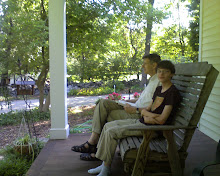Reading and hearing TV broadcasts about Republican "base" voters has been a distressing experience. It seems to me that the "base" consists of three types of voter: the ideologue, the fearful, and the selfish. We are not dealing here with simple ignorance. Ignorant people can learn. The "base" does not seem to have that ability, because each voter type starts with a fixed point of view.
The ideologue: typically, but not solely, an evangelical who responds to leaders claiming to have heard the word of God. If God spoke, then we of course must obey. There is no room for disagreement or alternative ideas; challengers to the word of God are evil, or to be charitable, just wrong. There seem to be many non-evangelicals who come to the political and public policy scene with equally firm, fixed, theoretical ideas. Once such an ideological world view exists, such people simply conform all information to the view. If, for example, one wishes to deny global warming, one simply insists that the scientists are corrupt or overlooking stuff, thereby producing false data. The denial comes first, shaping the apprehension of fact. Aspects of the ideological world view also characterize the fearful and the selfish.
The fearful: the historical evidence, as reported in Daniel Pinker's book, indicates that the world has steadily gotten safer from war and other forcible attacks, and other evidence shows that people have steadily gotten safer from natural disasters, disease, and starvation. Nevertheless, it seems that many Americans are more fearful than ever before, perhaps because of the global dragnet for news that now bombards every household. Fearful people act very cruelly and inconsiderately, because they believe their survival, or that of their loved ones, depends on killing or otherwise eliminating those who they see as threatening. They also seek strongmen, often dictators or demagogues, to lead the nation out of danger. As with the ideologues, their preset ideas about danger override all other considerations, including actual fact.
The selfish: perhaps few people are deeply selfish, but selfishness seems to characterize many of the billionaires and multi-millionaires who finance politics these days. These are people, like the Koch Brothers, who pursue their own immediate self interests without regard for the consequences to others. They may well adopt and believe in ideologies that justify or at least support the measures that seem in their self interest.
Perhaps the people I have described do not make up a majority of the eligible voters. But they certainly seem to constitute a very large segment of those among the eligible voters who actually vote. To be sure, there are many eligible voters who take more thoughtful positions. Unfortunately, there are also many eligible voters who take no position and rarely, if ever, actually vote, or if they do vote, base their votes on tribal identification.
The question this next Presidential election may decide is whether or not democracy, as wounded by the current Supreme Court, can survive these forces.
Tuesday, October 20, 2015
Subscribe to:
Comments (Atom)

